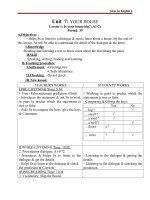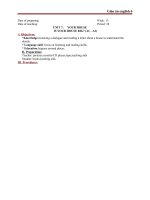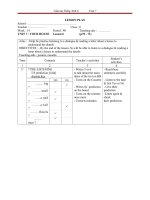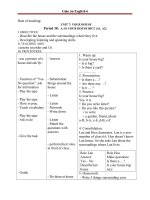Giáo án Tiếng Anh 9 unit 7: Saving energy
Bạn đang xem bản rút gọn của tài liệu. Xem và tải ngay bản đầy đủ của tài liệu tại đây (183.65 KB, 12 trang )
GIÁO ÁN TIẾNG ANH LỚP 9.
Period 42
Unit7: Save energy
Lesson 1: Getting started
Listen and read
I. Aims : Students will be able to understand the dialogue and the way to save energy and
related words or phrase.
II. Language contents:
1. Vocabulary :garbage dump, air pollution, water pollution .…
2. Structure :
3. Skills : reading, speaking
III. Techniques: matching, answer given
IV. Teaching aids : Textbook, pictures
V. Procedure :
CONTENTS
TEACHER’S & STUDENTS’ ACTIVITIES
* Warm – up :
UNIT 7.
- T. has sts look at the pictures. Work with a parner to
SAVING ENERGY
make a list of things the family could do to save energy.
Period 43. Getting Stared & Listen and
- Ss. called to read the list aloud:
Read
• save water by turning off faucet when there is
enough water supply.
• Turn off the lights when unnecessary
• Turn off the radio and TV when nobody watches * New words :
- Water bill (n): statement of charges for
• …
water used.
* Presentation:
Enermous (a): big or huge.
-T. you are going to listen to the dialogue between Mrs.
- Crack (v): to break without complete
Mai and Mrs. Ha aabout the water bill this month.
separation of parts.
-Ss. listen to the dialogue and pick out some new words
- Pipe (n): tube of metal for conveying
-T. introduces new words.
water.
-Ss. sts repeat them after T
- Plumber (n): person who installs and
* Practice
repairs pipes and plumbing.
- T. gets sts to listen to the dialogue again and then
- Dripping faucet (n): the tap with
practice the dialogue with their parners.
falling drop of water.
- Ss. practice the dialogue aloud
a.
Practice
the dialogue with a partner.
- T. gives feedback on sts’ pronunciation and intonation,
corrects mistakes if any.
b. True or False? Check () the bexes. Then correct b. True or False? Check ( ) the bexes. Then
the false statements.
correct the false statements.
-T. has sts read the dialogue again and correct false
statements and compare their answers with their parners
-Ss. asked to answer before class then write the corect
sentece on the board.
1. Mrs. Ha is worried about her bill water.
2. Mrs. Mi gives Mrs. Ha advice on how to
save water
3. Mrs. Ha has checked the pipes in her
house and found no cracks
4. Mrs. Ha suggests getting some tool to
check cracks in the pipes.
5. Mrs. Mi suggests taking showers to save
water
T
F
-T. gives feedback and the answers
* Production
-Ss. are asked to match words
Words
1. water bill
2. enermous
3. crack
4. pipe
5. plumber
6. dripping faucet
Meaning
a.thợ sửa ống nước
b. hoá đơn tiền nước
c. vòi nước bị nhỏ rọt
d.to, lớn
e. ống nước
f. vết nứt, gãy
* Homework :
- T, summarizezs main points
- Asks students : Learn their lessons.
Prepare for the next period : Speak ;
Listen( Unit 7)
T
1. Mrs. Ha is worried about her bill
water.
2. Mrs. Mi gives Mrs. Ha advice
on how to save water
3. Mrs. Ha hasn’t checked the
pipes in her house and found no
cracks
4. Mrs. Ha suggests taking
showers.
5. Mrs. Mi suggests taking showers
to save water
F
Period 43
Unit7: Save energy
Lesson 2: Speak and listen
I. Aims : Students will be able to use suggestions to suggest way to save energy and how o
response to suggestions.
II. Language contents :
1. Vocabulary :…
2. Structure : expressions in the lesson
3. Skills : speaking
III. Techniques: answer given
IV. Teaching aids : Textbook, pictures
V. Procedure :
TEACHER’S & STUDENTS’ ACTIVITIES
* Warm – up : answer given
- T. asks sts to tell some way to save energy and write
some words.
I. Speaking:
* Presentation:
-T. reminds sts of the ways to make suggestions
Suggestions
Response
I suggest + V-ing
OK
I think we should …
That’s a good idea.
Shall we …?
All right
Why don’t we …?
No, I don’t want to.
How about + V-ing
I prefer to …
What about + V- ing
Let’s …
Let’s …
- Ps. asked to make sentences with above structures
* Practice
-T. has sts to look at the expressions in the above tables
and pictures in the board to make suggestions about how
to save energy. Follow example:
- T. gives example:
• I think we should turn off the faucet.
• I suggest fixing the faucet
CONTENTS
a. Look at the expressions in the tables
and pictures. Make suggestions about
how to save energy
Suggestions
I suggest + V-ing
I think we should …
Shall we …?
Why don’t we …?
How about + V-ing
What about + V- ing
Let’s …
Response
OK
That’s a good idea.
All right
No, I don’t want to.
I prefer to …
Let’s …
Example
• I think we should turn off the faucet.
• I suggest fixing the faucet
• New words :
- Ps. called to read suggestions aloud.
- T. gives feedback and suggested answers
a. I think we should turn off the faucet.
b. I think we should turn off the gas fire
c. I suggest turning off the fan.
d. I think we should turn off the air conditioner
when no one is in.
e. I think we shouldn’t go to school by motorbike.
f. Let’s go school by bus or bicycle.
II. Listening:
* Pre – listening :
-T. shows sts apic- of a pan used to get solar energy to
boil water and cook food in central Vietnam.
- T: why do they use this device?
-Ss: save electricity , save energy
- T. leads sts to some new words.
T. expains ; nuclear power..,
* While listening :
- T. sets the scene : You will listen to the news on solar
energy and decide the following statements are true or
false.
- Ss. listen to the tape and complete the task (twice or
three times).
- Ss. compares their answers with their parners.
* Post listening
- T. calls students to read aloud the answers and correct
false sentences.
- T. gives feedback and answer key
b. Listen again and fill in each blank with one word
you hear.
- Ss. listen to the tape again and do the second task. Fill
in the blank with one word you hear.
Ss. called to the missing words aloud.
- T. gives feedback and answer key.
* Homework :
- T. asks students :
- write some way about making use of solar energy.
- learn their lessons.
- prepare for the next period : Read ( Unit 7)
•
D: Great! Let’s do that.
New words :
Solar (a): belongs to the sun
Solar energy (n): energy like electricity
received from the sun.
Nuclear power (n) power derived from
nuclear energy
Solar panel (n): device like walls or
doors for receiving solar rediation
Advanced (a): ahead of time / high
level
Roof (n): upper covering of a house
a.Listen to the news on solar energy and
decide whether the statements are true or
false. Check ( ) the boxes and correct the
false sentences.
T F
1.Solar energy can be cheap and
clean.
2. Most of our electricity now comes
from the use of coal, gas, oil, or
nuclear power.
3. The solar energy that gets to the
Earth can provide enough power for
the world’s population.
4. Solar energy can be used on
cloudy days
5. All buildings in Sweden will be
heated by solar enegy in 2015.
b. Listen again and fill in each blank with
one word you hear.
1.The Sun can be an effective source of power.
2. Solar energy doesn’t cause pollution.
3. A lot of countries in the world are already
using solar energy.
4. It’s possible to store solar energy for a
number of days.
5. Solar panels are installed on the roof of a
house to receive the energy from the Sun.
6. We can save natural resources by using solar
energy instead of coal, gas and oil.
Period 44
Unit7: Save energy
Lesson 3: Read
I. Aims : Students will be able to understand the gist, details about ways to save energy.
II. Language contents :
1. Vocabulary : consumer, household, account for …
2. Structure :
3. Skills : reading
III. Techniques: answer given
IV. Teaching aids : Textbook, pictures
V. Procedure :
TEACHER’S & STUDENTS’ ACTIVITIES
CONTENTS
* Warm – up : answer given
* New words :
- T. asks sts
- luxury (n):
- Make some suggestions about how to save
- necessity (n):
anergy?
- consumer (n): user f product or service
-Ss : answer
- household (n): family
o turn off the TV, the radio, the fan when
- labling scheme (n): campaign that gives
lables to products
no one is in the room
- tumble dryer (n): machine that drys
o turn off the faucet before leaving house
things usually hair or clothes.
o take shower instead of baths
- Innovation (n): bringing in new ideals,
making changes
* Pre – reading :
-T. asks sts to read the passage very quickly and
a) Which of the following is the best
answer the following questions:
summary of the passage .
1. Which continents are mentioned in the text?
2. Are electricity, gas, and water are not luxuries
but necessities?
3. North American and European countries are
-Ps. answer:
interested in saving money and natural
1. America and Europe
resources
2. They are necessities.
a) Which of the following is the best summary of the
passage .
- T. introduces some new words and explains them
-T. has sts to read the passage carefully and choose the
best summary for it among four following options
1. Energy-saving bulbs should be used to save
energy.
2. In Western countries electricity, gas and water
are necessities.
3. North American and European countries are
interested in saving money and natural resources. b. Answer the questions. Write the answers
4. Labling schemes help save energy.
in your exercise book.
* While reading :
1. Western consumers are interested in
-Ss. answer after reading
products that will not only work
- T. corrects and explains that 3) the best answer because
effectively but also save money.
three others are too specific. They only cover one part of
2. We can use energy-saving bulbs
the passage.
instead of ordinary 100 watt-light
bulbs to spend less on ighting.
3. She will pay US$2 for lighting if she
uses energy-saving bulbs instead.
b. Answer. Then write the answers in your exercise
4. The purpose of the labeling scheme is
books.
to help consumers to know how
-T. has sts answer the following questions:
efficient each modal is, compared with
1. What are Western consumers interested in?
other appliances in the same category
2. What can we do to spend less on lighting?
so that they can save money and
3. Mrs. Jones uses only two ordinary bulbs and she
energy.
pays US$8 for lighting. How much will she pay
5. We should save energy…
if she uses two energy-saving bulbs instead?
4. What is the purpose of the labling schemes?
-Ss. read and answer.
* Post- reading
-T. calls some students to tell the class their answers.
-T. corrects and gives answer key.
- T, expand the topic by opening a discussion on
questions.
Why should we save energy?
Ss. work in group and answer:
• Save money
• Protect the environment.
• Prevent natural resources.
…
* Homework :
- Summarize main points and ask sts to learn their
lesson at home, do exercise 4, and prepare for the
next period : Write ( Unit 7)
Period 45
Unit7: Save energy
Lesson 4: Write
I. Aims : Students will be able to write a speech about energy saving with clear organization and
present it in front of the class and other school-related topics.
II. Language contents :
1. Vocabulary :
2. Structure :
3. Skills : writing
III. Techniques: matching, answer given
IV. Teaching aids : Textbook, pictures
V. Procedure :
TEACHER’S & STUDENTS’ ACTIVITIES
CONTENTS
* Warm – up : “ Noughts and crosses”
-T. expains how to do it.
Ps. divided ito two groups to make sentence with the
words in the box after choosing it. A correct sentence gets
O or X. The group with three O or X vertically,
horizontally will be the winner.
electricity
air conditioner
turn off
gas
consumer
solar energy
plumber
water bill
natural
resources
* Pre – writing :
-T. asks sts.
a. Match each part of a speech in column A
How many sections are there in your Vietnamese essay?
to a suitable function in column B.
-Ps. answer
There are three sections: Intrduction, body and conclusion
A
B
T: in an English speech also has three parts: Intrduction,
Parts of a
Funtions
body and conclusion
speech
-T. asks sts
4. Intrduction
What do we do in each part?
Getting
people’s
- P. answer (it’s up to sts )
attention and telling
a. Match each part of a speech in column A to a
them what you are going
suitable function in column B.
-T. to understand more about it. You match each part of a
speech in column A to a suitable function in column B.
Parts of a
Funtions
speech
1. Intrduction
A. summing up what you have said.
2. Body
3. Conclution
B.getting people’s attention and
telling them what you are going to
talk about.
A. giving details in easy- tounderstand language.
5. Body
6. Conclution
to talk about
Giving details in easyto- understand language.
Summing up what you
have said
b. Put the following sections in the correct
place to complete the speech.
-
Good evening, ladies and gentlemen.
I’m professor Roberts and tonight I’m
going to tell you how to save money
•
Most of us use too much gas.
T. has sts match and then answer before class.
You
can
reduce this amount by:
T. gives feed back
•
Traveling by bicycle or public
b. Put the following sections in the correct place to
transport
complete the speech.
- Having a mechanic check your
-T. explains the requiry.
motorcycle regularly.
- Ps. work in pair, put the sections in the correct place to
- If you follow these simple rules, not
complete the speech.
only will you save money, but also the
- Ps. called to deliver the speech in front of the class
environment will be cleaner.
-T. comments and correct any mistakes
c. Choose one of the following topics and
* While writing :
c. Choose one of the following topics and prepare a prepare a speech for your classmates. The
speech for your classmates. The ideas in the callouts ideas in the callouts may help you.
may help you.
- T. tells sts to choose one of the following topics: reduce Reducing garbage
Good morning, ladies and gentlemen.
garbage, reduce paper, saving energy in the kitchen and
Thank you for coming here today. I’m
then prepare a speech for class
Professor Trang, President of Friends
* Post writing :
of the Earth. I’m going to tell you
-Ps.compare their writing with their classmate and ask
about the way of reduce garbage.
their friend to give remarks.
As you know that reducing garbage is
-Ps. deliver their speech before class.
necessary. We can reduce garbage
- T. gives comments on sts’ pronunciation, body
by:
language…
• Collecting plastic bags.
- T. gives feedback and suggested writing
Reusing paper
• Not keeping solid waste with
Good evening everybody.I’m glad to be here this
food waste
evening. My name’s Quan. I come from grade 9A
• Putting different kinds of waste
3 . I’m going to talk to you about reusing paper.
in different places.
There are two ways to reuse paper
I hope that you will be able to find the most
• Firstly, we should have a separate suitable way to reduce the amount of garbage
wastebasket for wate paper
we produce.
• Secondly, we should keep sheets with
single prined page for drafting
-
If you follow these simple rules, not only will save
money, but also the environment will be cleaner.
Saving energy in the kitchen
Hi everybody. It’’s a pleasure to be here with you
today. My name’s Thi. Our topic today is ways of
saving energy in the kitchen by:
• Turning off the lights.
• Prepare food carefully before turning on
the stove
• Keeping refrigerator door close.
If you follow these rules, not only will you save money,
but also the environment will be cleaner.
* Homework :
- T emphasizes some main points, asks sts to learn
their lesson, do exercise 5 and prepare the next
lesson the language focus of unit 7
Period 46
Unit7: Save energy
Lesson5: Language focus
I. Aims : Students will be able to futher improve their understanding about common connectives,
phrasal verbs and suggestions and make suggestions.
II. Language contents :
1. Vocabulary : review
2. Structure : review: common connectives, phrasal verbs and suggestions
3. Skills : writing
III. Techniques: gap filling
IV. Teaching aids : Textbook…
V. Procedure :
TEACHER’S & STUDENTS’ ACTIVITIES
* Warm – up :
-T. has sts work in group, review all the ways to save
energy which they have learned in unit 7.
Ps. give out
T. gives comments and marks.
1. Complete the sentences. Use the correct
connectives..
-T. gives sts some simple sentences and gets sts to use “
and, but, because, however ans so” to combine nto one.
Example:
• She went to the canteen. She drank a glass of
water. (and)
• The country air is peaceful. The medical
facilities are not acessible. (but)
• It rained heavily. The students didn’t go to
school on time. (so)
-T. now you choose one connective in bracket to
combine each pair of sentences into one.
-Ps. finish them and read aloud sentence by sentence
(individuals)
-Ps. others remark
CONTENTS
UNIT 7.
SAVING ENERGY
Period 48.
LANGUAGE FOCUS
1.Complete the sentences. Use the correct
connectives..
a. Mrs. Quyen bought corn, patatoes and
cabbages at the market.
b. I’d love to play volleyball but I have to
complete an assignment
c. Nam got wet because he forgot his
umbrella.
d. Hoa failed her math test. Therefore, she
has to do the test again.
e. Do you want Vietnamese tea or milk
tea?
f. It’s raining, so I can’t go to the beach.
g. Ba’s hobbies are playing football and
collecting stamps.
h. Na is very tired. However, she has to
finish her homework before she goes to
bed.
-T. gives feedback
2. Complete the sentences. Using the right
tense form of the phrasal verbs in the box and
2. Complete the sentences. Using the right tense form the pictures.
of the phrasal verbs in the box and the pictures.
a. Hanh can’t go to the movies with us
-T. shows sts pic- and asks them to describe them.
tonight. She will have to look after her
a. She is looking after the baby.
little baby.
b. The faucet is flowing. The woman is washing the
b. If we go on wasting water, there will be
clothes.
a shortage of fresh water in a few
c. She is looking for something.
decades.
d. She asks the boy to turn on the TV.
c. “Turn on the TV for me, will you? I
e. She opens the door ahd sees the floor is full of
want to watch then weather forecast.”
water
d. “ I think I lost my pen. I’ve looked for it
-Ps. look at the box and read given verbs and then fill
everywhere and I can’t find it anywhere.
in the blanks.
e. Ms. Yen forgot to turn off the faucet
- Ps. change the result with their partner and read
when she left for work.
sentence by sentences aloud
-T. gives feedback
3. Make suggestions.
-T. explains the requiry and has sts showb out how to 3. Make suggestions.
make suggestions.
a. Your class want to help the poor in the
- T. gives example.
neighborhood of your school. The
- P. make suggestions basing on given cues
following ideas may help you.
- Ps. change the result with their partner and then read Example: I suggest collecting some money.
aloud
- T. corrects mistakes
i.
I suggest collecting unused clothes.
ii.
I think we should organize a show to
raise money.
iii.
Why don’t we give lessons to the poor
children.
iv.
What about helping elderly people and
war invalids with their
chores.
v.
…
b. Your friend wants to improve his / her
English
Example: I suggest (that) you should work
harder on your pronunciation
•
•
* Homework :
- T. emphasizes some main points
- Ps. review their lesson
•
•
I suggest that you should write sentence
with new words.
I suggest that you should speak English
in class
I suggest that you should buy a good
dictionary
I suggest that you should do some
- Ps. prepares next lesson: Unit 8- Getting started and
Listen And Read
reading every day.









